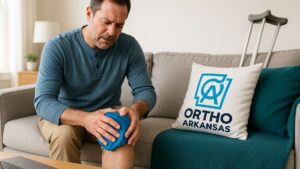Most of us are all too familiar with how stress can impact our daily lives. It does a double-whammy on our overall health from our moods to our bones.
Kick stress to the curb. Chronic stress is harmful to our mental state and lowers the immune system, which can lead to poor bone health. Daily exercise and proper hydration are important steps toward better health, better moods — and healthier bones.
Simple steps toward stronger bones
It only takes a few habits to take steps toward healthier bones.
We’ve discussed before that stress affects bones because stress raises cortisol levels. Too much cortisol has a negative effect and causes bone loss, which can lead to osteoporosis later in life.
However, chronic dehydration also raises cortisol levels, and dehydration itself is a cause of stress and anxiety.
Proper hydration is often underestimated as a simple way to improve our overall well-being. Dehydration is a frequent cause of hospitalization, and it is known to complicate many medical conditions. Every part of our body, including our bones, requires plenty of fluids to function properly.
Exercise elevates mood, immunity and bone density
We benefit a lot from a little exercise. Just 20 minutes of physical activity per day can kickstart the immune system, boost moods, and rebuild bone.
Bones are living tissue and just like the muscles, exercise makes them stronger. Bones become denser when we keep them in motion. With regular light exercise, our bones respond by building more bone. Exercise also improves balance which helps to avoid falls, which is especially important as we age.
A boost to the immune system, exercising is a tune-up that delivers oxygen and nutrients to the tissues, increases blood flow, and aids in waste elimination, which is essential to our metabolism. A smoothly-running metabolism provides more energy to tackle the day.
Our minds respond to exercise by releasing chemicals beneficial to our moods. Although the links between anxiety and exercise aren’t entirely clear, physical activity does ease symptoms of stress. Individuals who lightly exert themselves daily also sleep better, which in turn has a further positive effect on moods.
Proper hydration lubricates bones and brains
We function at our best when we are hydrated. Water lubricates the joints and brings nutrients, such as calcium, to bones.
Our bones are not dry, they are actually about 30 percent water. Ample amounts of water keep bone marrow healthy and prevent shrinkage and bone loss.
Drinking enough water also decreases anxiety and keeps our minds sharp. Confusion, fatigue, and depression are common symptoms of severe dehydration. The brain is 73 percent water, so it is not surprising that there is a deep connection between water consumption and maintaining a healthy mind.
Active at any age
Make more movement a daily goal. Exercise comes in many forms, and it is possible to stay active at any age. We all have varying ranges of motion and mobility. From an exercise class or daily walk to household chores, there are many ways to add activity to your day. The result may be a less stressful mind and stronger bones.
Exercise Success Tips
- Start slowly. It takes time to build strength or endurance when starting an exercise regime. Increase repetitions or weight slowly.
- Don’t overdo it. It is normal to experience some stiffness or soreness after exercise. However, rest your muscles for a few days if it is difficult to move after exercising.
- Never ignore pain. If an exercise hurts, stop the exercise. Exercise may be challenging, but it should not be painful.
- Consult a specialist. Ask a specialist if you are in discomfort or experience limited mobility.













